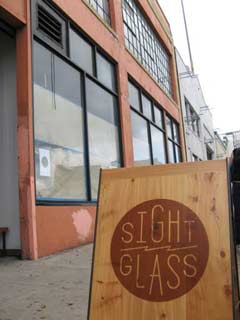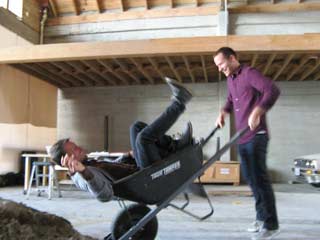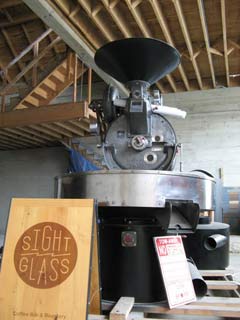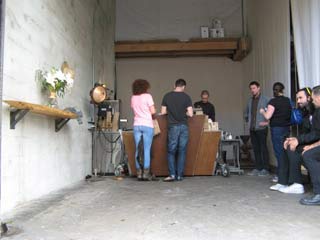




This section is written by Erin Archuleta, half of the talent behind local outfit ICHI Catering (@ICHISUSHI). Outside of the foodie world she works full-time championing kid literacy at 826 National. Keep up with her on Twitter @erinarchuleta.
Coming from Flint, Michigan, my version of coffee well into adulthood involved blue tin Maxwell House coffee cans repurposed for snow fort brick-building, and sparkly Folgers flavor crystals that would soon make up the muddied contents of my dad's Aladdin thermos for his second or third shift commute to work on the assembly line. Meeting brothers and Sightglass Coffee (270 7th Street at Howard Street) business partners Jerad and Justin Morrison, it was obvious that they grew up with a different, more crafted version of the muddy brown liquid my own working-class hometown knew as a drip brew.
The Pacific Northwest's tradition of coffee-roaster craftsmanship has fostered these brothers' quest to emulate and surpass the coffees they roasted and served over the last ten years in Seattle, Washington (Jerad) and Eugene, Oregon (Justin). Now, combining what some may consider flannel-town forces, the brothers clearly have spent their time doing their artisan homework for us all to enjoy in the form of a "light industrial retail café space." What San Francisco zoning can't explain about the concept that Jerad and Justin have drafted up, along with architect partners Boor Bridges, is that you are in a coffee roastery from the moment you pass through the front.
Most roasteries are coffee houses first, with the roasting equipment in the back. Playing on the image of a "sight glass," or meter by which you can gauge how much liquid is contained inside, the brothers have allowed us a peek inside the process of creating their version of the perfect cup of coffee. Their antique mechanical (not computer-based) roasting equipment will be in the front of the space, taking up what's usually considered prime real estate in front of the tall warehouse windows. Guests will find themselves between beans, burlap bags, and baristas in this new take on a gathering spot.
Jerad and Justin were so hands-on that they repurposed the antique roasting machines themselves. It's one thing to know your craft well, it's another to understand the machinery on such a level that you can take it apart and put it back together in a new and improved way. The 1961 Probat roaster that they found in Germany was worth the shipping costs according to the brothers, because they would have more complete control over how the beans were roasted. They explained to me (a reformed Maxwell House girl), that when you allow a computerized mechanism to come into the process, you lose some of the ability to manipulate time and the depth of the roast. They are on a mission to get back to a more Old World way of doing coffee, based on the sensory experience of the roasting.
With the logistics worked out, the gentlemen have a way to go on their build-out. But, it seems that they have a strong timeline (and a current coffee cart in their space) to support them. In an unusual business model, the brothers are open for business before their main space is completed. Customers are welcomed in to peek at the construction between 8am—5pm seven days a week while grabbing a cup of coffee or a small sweet in their little Seventh Street coffee garage space. It's funny to consider that this little cart will soon take on the 4,000-square-foot warehouse that once housed a sign company in its South of Market digs.
The bulk of their work involved sandblasting the warehouse, and then jack hammering (themselves!) and trenching about 150 feet to lay new plumbing and run electrical conduit. They have been stoked with their partnership with MHC Engineers and are looking forward to breezing through their upcoming inspections. Erasing traces of the former sign company took eight dump trucks loaded full of debris. Sandblasting the remaining frame of their space to get down to the original old-growth Douglas-fir took three weeks, but was worth the effort to reuse the gorgeous resources already available to them.
Clearing out the space, a long skylight was revealed, and with advice from their architects, another eight skylights will be added. Local reuse lighting designer Kevin Randolph will be supporting the design vision with his custom fixtures for the space. (You can read more about Kevin's other projects in a previous hardhat on Bar Crudo here.)
Their bar is an unusual concept, which will be a central focus of the design. Instead of the domino rows of tables covered in laptops with no one talking, Jerad and Justin are encouraging community by having one huge central coffee bar with stools surrounding it. They are planning for some communal tables in the back where the laptop crew can click away in silence. Mindful of the existing warm Douglas-fir and cool concrete and steel bones of the building, they sourced furniture maker friend Earl Gonzales of EVG Design (and formerly of Linden Street Design) to create the bar and tables from local lumber. Earl will be relying on the brothers and their friend Mark Rogero from Concreteworks to pour the large bar, which will be a combination of concrete and the local bay laurel slabs he is sourcing. The bar will feature a couple of Slayer espresso machines (insert obvious heavy metal joke about Raining Blood here), which support the barista's ability to control more of the coffee experience.
They have found a boon in storage, as well. There's a loft that they will use for their administrative offices and extra storage space once their distribution business is up and running. They are taking advantage of a niche market by offering direct trade coffees instead of just fair trade, cultivating relations with individual growers, and hope to support these growers' fair business practices over time.



